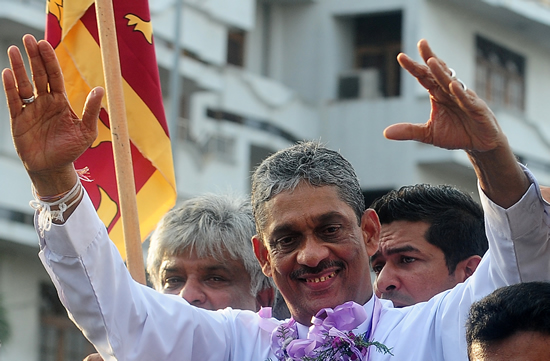
Sri Lanka's former army chief Sarath Fonseka gestures to supporters as he leaves the main prison in Colombo on May 21, 2012. AFP/GettyImages
Three days after Secretary of State Hillary Clinton and Sri Lankan Foreign Minister G.L. Peiris met in Washington, D.C., to discuss Sri Lanka’s human rights record, former Sri Lankan Army General Sarath Fonseka was released from prison.
Fonseka is viewed as a war hero by the Sinhalese majority for his victory over the terrorist group Liberation Tigers of Tamil Eelam (LTTE) in 2009, ending a decades-long civil war. He resigned from his post as Chief of Defense Staff in 2009 to run for the presidency. He was defeated by Mahinda Rajapaksa by a 17-point margin. Fonseka was arrested one week later and subjected to court martial for “military offenses.” He was discharged dishonorably from the military, sentenced to a three-year prison term, and unseated from Parliament in 2010. In November 2011, he was handed down another three-year prison term. Many assume his imprisonment was politically motivated for Rajapaksa to quash Fonseka’s overwhelming national popularity and prevent competition in future elections. The Obama Administration designated Fonseka a political prisoner, calling for his release.
Sri Lanka’s human rights record has been a key concern of the United States since the ending of the Sri Lankan civil war in 2009 and the subsequent release of the Lessons Learnt and Reconciliation Commission (LLRC) report in 2010. Debate over the implementation speed of the LLRC report recommendations has heated relations between Sri Lanka and the international community. The internationally perceived lack of seriousness and commitment displayed by the Sri Lankan government toward reform produced a U.N. resolution in March forcing Sri Lanka to implement the LLRC recommendations.
The increased international attention has caused an uproar within the country, many calling the resolution an attack on the “sovereign rights of the state.” The United States has been adamant that Sri Lanka apply the LLRC proposals, work to improve its human rights record, and respect civil liberties. The Sri Lankan government asserts that Fonseka’s release is not the outcome of increased international or national pressure.
Sarath Fonseka’s freedom is a small victory for human rights watchers and a step in the right direction for Sri Lanka on the path to democracy. The Sri Lankan government should continue to apply the LLRC recommendations it is capable of immediately implementing to illustrate its commitment to justice, reform, and unity. Clinton urged Peiris to create and publicly promote an “action plan” for the implementation of the remainder of the LLRC recommendations to demonstrate the “importance of accountability, and strengthen public confidence in the process, and speed up the healing of the country.” Although Peiris did not come to Washington with an action plan in hand, he is certainly aware that the government’s actions will continue to be closely monitored for progress. Hopefully, the release of General Fonseka will prove to be one of many actions illustrating Sri Lanka’s willingness to carry out reform and promote democracy.